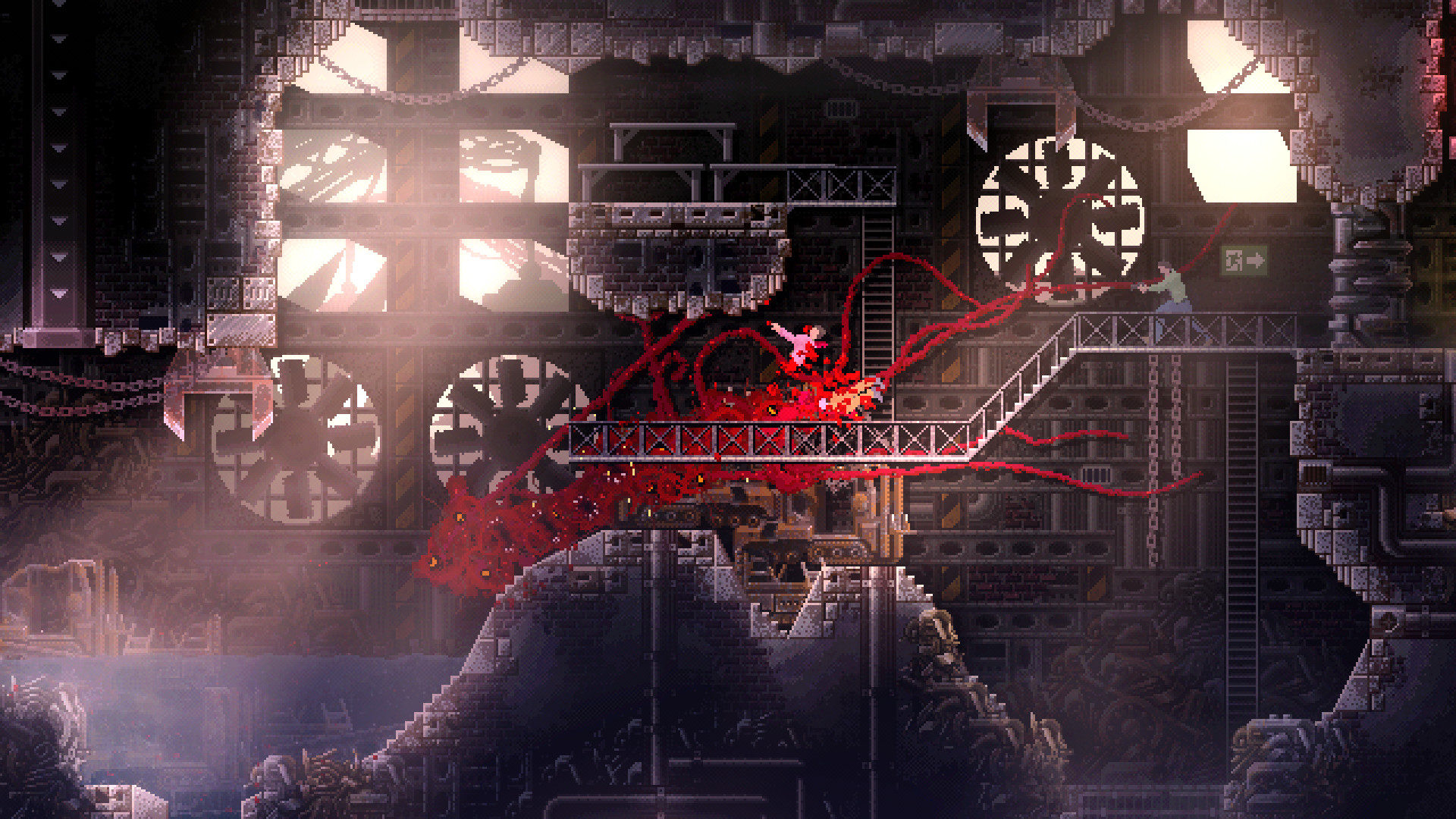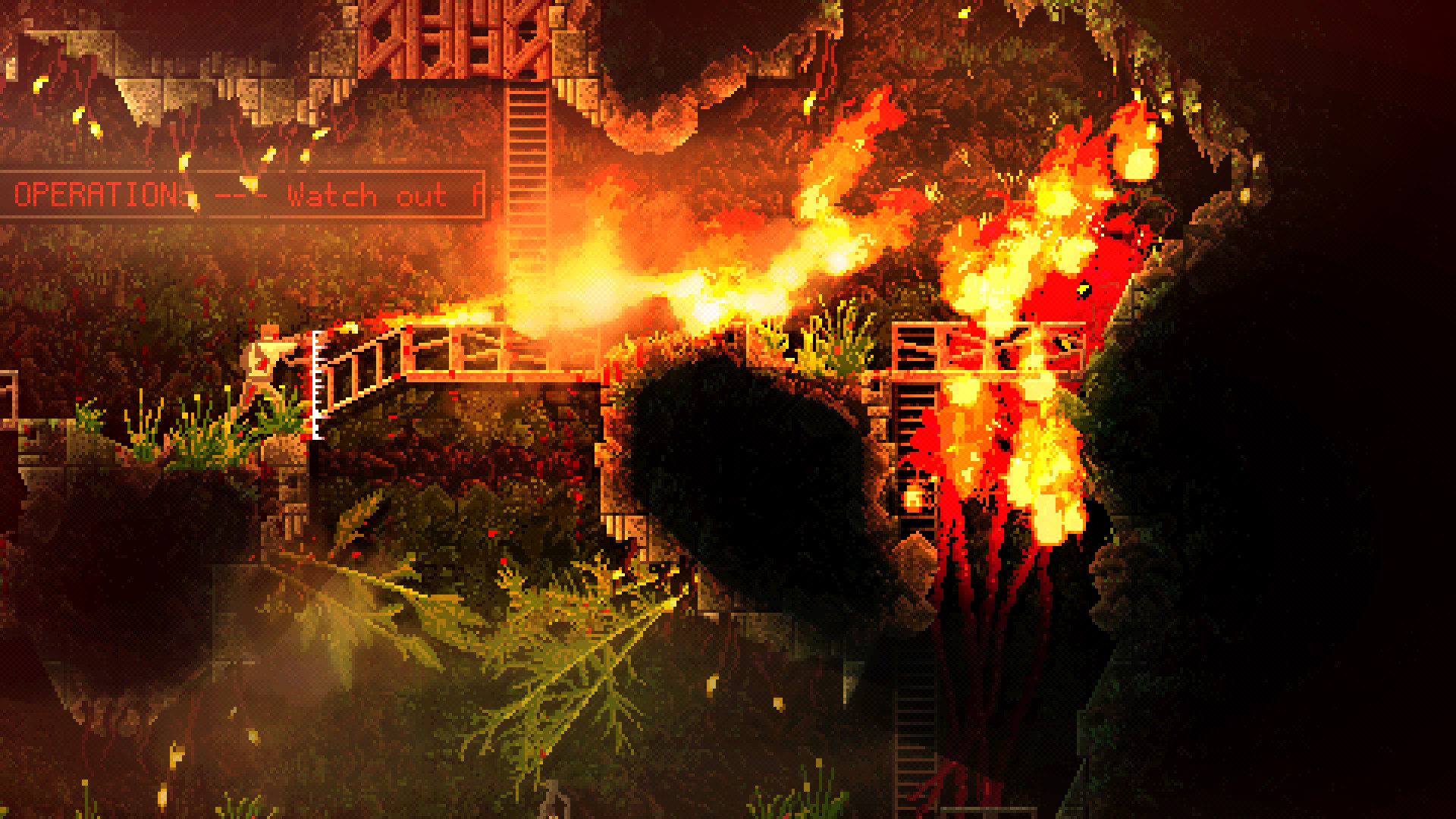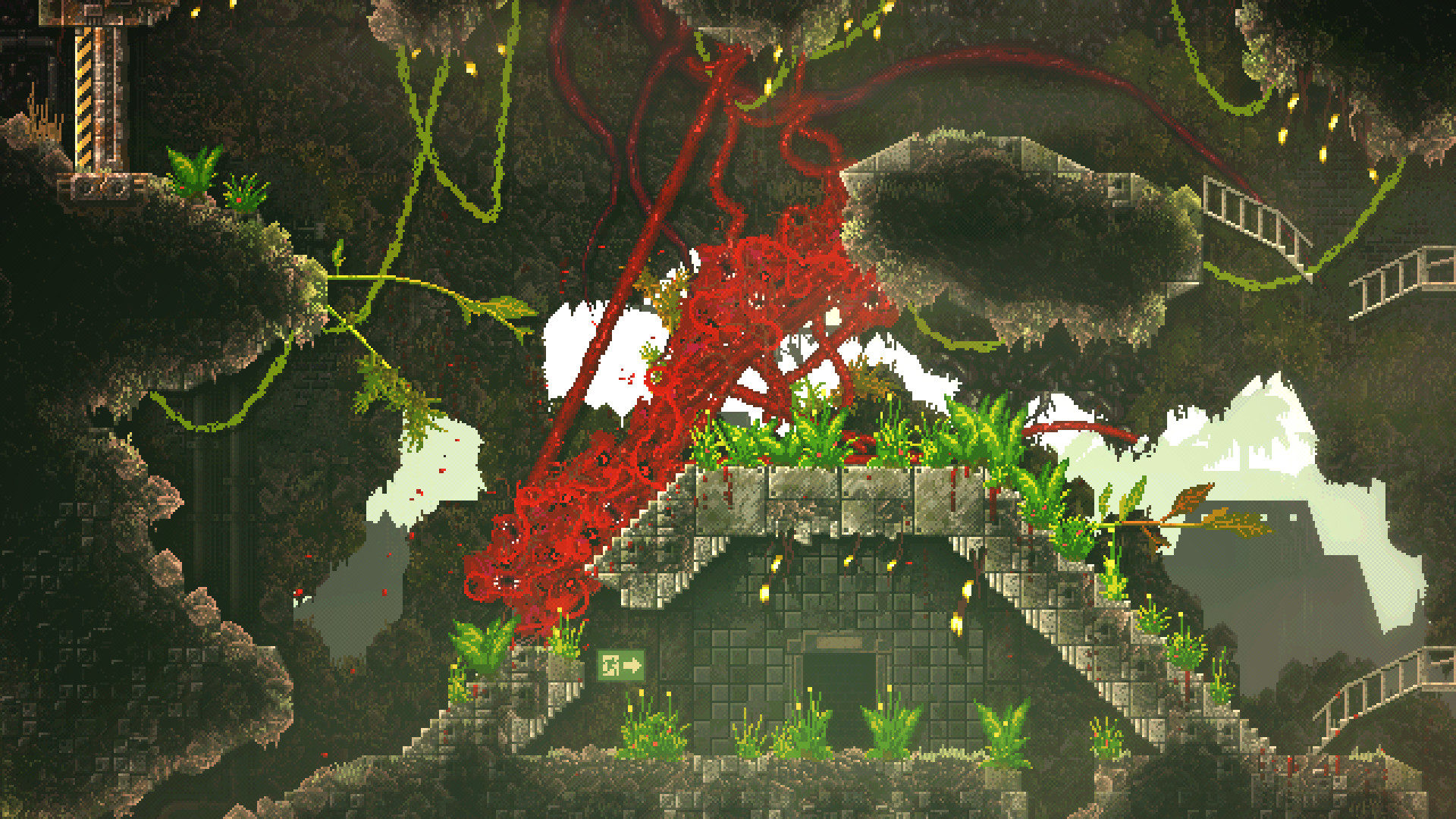I don’t know what it says about me that two of my favorite games this year—Maneater and now Carrion—let the player be the monster. Certainly there is some kind of catharsis in the specific power fantasies that these games provide. “Monsters,” as John Carpenter has said, “are us, the dangerous parts of us. The part that wants to destroy; the part of us with the reptile brain. The part of us that’s vicious and cruel.” In his 1982 masterpiece The Thing, anyone can be the monster, and isn’t there at least some small part of us, when watching horror movies or playing horror games, that would rather be the monster than the victim? Wouldn’t you rather be the xenomorph than the poor schmuck crawling through the vents?
But where Maneater’s moral compass points solidly in the direction of the shark, Carrion’s is a little more ambiguous. Sure, as the globular, sinewy monster, you’re trapped in the beginning, kept behind glass in a laboratory, but it quickly becomes apparent why that’s the case. Unlike the shark in Maneater, you aren’t a force of nature reclaiming your rightful place. You’re a dangerous, infectious disease-made-flesh. There’s no dialogue in the game, so how you got there is gradually presented in silent flashbacks, but your intentions remain unclear. Are you getting revenge for wrongful imprisonment? Are you simply following your natural instincts to consume? Or are you gratuitously, egocentrically flexing your muscles as the apex predator?
One of the more refreshing ways that Carrion presents its power fantasy is by setting it in a 2D space, specifically in how it allows you to move through that space. While the game’s underground laboratory has the same maze-like quality of any Metroidvania, there’s no platforming. The environment isn’t a threat, as your prehensile tendrils allow you to move your body—which I can only describe as a meatball with piranha fangs—through space like an airborne virus. Already, where most games would fall back on gravity as an obstacle, Carrion removes those limits, juxtaposing you with your meek, bipedal enemies.

That’s not to say that you can’t die in Carrion, though technically you really can’t die, seeing as how the hivemind organisms you’re spreading throughout the laboratory that act as save points can simply remake you. But you can be hindered, both by the game’s puzzles and several varieties of armed humans, their weapons ranging from pistols to flamethrowers to mech suits with chain guns. The puzzles aren’t particularly difficult, but they can be clever and satisfying to solve, punctuated each time with the gratifying metallic whir of a blast door opening to the next area. The human enemies, on the other hand, require a little more finesse and can take you down if you’re uncareful and too erratic.
Killing and devouring your enemies is the heart of Carrion; the entire game seems developed around the concept of using your movement, your tendrils, and special abilities you unlock over the course of the game to tear humans in half and gulp down their remains. Its 2D, pixel-art style doesn’t allow the game to cynically drift into the macabre spectacle of outright gore, but the violence you enact on the enemies sure can be impactful. They scream and gurgle as their legs are rended from their torsos. It isn’t as gratuitous as The Last of Us Part II’s death-rattles, desperate sobs, and decapitations, but Carrion’s intentions with how it presents murder aren’t as single-minded, either.
The combat (if you can even call it that) starts with grabbing and gobbling as its foundation and builds from there. Even before you unlock more abilities, simply snatching up an enemy and eating them is pretty darn satisfying—as is grabbing a soda machine or a vent cover and crushing someone with it. But it’s when you start unlocking new “masses” (i.e., bigger pieces of your body that add to your health bar) and abilities for each mass tier that the game turns into a true monster sim. These abilities range from invisibility, web-like projectiles, spiked armor, and massive spears that shoot out into the world, pierce whatever they can, and drag the detritus back to you. My personal favorite, however, is a later-game ability that lets you take control of an enemy. You can make them open doors, use their weapons, and even control a mech. The only downside to unveiling these abilities over the course of the entire game is that Carrion’s puzzles don’t reach their best until near the end of the game, when you finally have everything unlocked.

That’s not to say you’ll be playing for long stretches without the tools that make the game fun. First of all, it’s a mercifully short game—quality over quantity. Furthermore, the game is fun from the very first seconds, with the initial escape and scramble to somewhere safe where you can regroup and enact your monster-y plot. All told, I beat the game in maybe five hours, mostly because it’s designed to be short, but also because there isn’t much of a challenge.
If that sounds like a criticism, it’s not. Carrion has a few tricky moments, but it’s mostly just a rip-roaring power trip. And how would the game even work, just by design, if a few puny humans could make your monster life difficult?
You’re truly not meant to be challenged in Carrion. At least, I don’t think you are. Instead, you’re supposed to scuttle, mangle, and tear through it. After all, as the apex predators in our current ecological situation, that’s what we do. If Phobia Game Studio was staffed entirely by vegetarians, I wouldn’t be surprised. Carrion literally casts you as a ball of genetically enhanced meat flipping the tables and devouring people, and it’s named after dead flesh to boot. But it’s in this concept of the apex predator and the pure, inconsequential joy of tearing through other living beings where Carrion lets you be the monster. Monsters are us, after all.

|
★★★★★
Carrion doesn’t just flip the horror script—it’s the ultimate power fantasy, packed into a tight, uncompromising space. It might utilize some video game tropes, but it doesn’t seem too concerned with accepted video game values. It’s a 2D side-scroller without platforming, an action game where you dictate the action. The Doom Slayer might talk a big game about ripping and tearing, but Carrion’s meatball monster puts its money where its many mouths are. |
Developer Phobia Game Studio Publisher Devolver Digital ESRB M - Mature Release Date 07.23.20 |
| Carrion is available on Xbox One, Switch, and PC. Primary version played was for Xbox One. Product was provided by Devolver Digital for the benefit of this coverage. EGM reviews on a scale of one to five stars. | |

Michael Goroff has written and edited for EGM since 2017. You can follow him on Twitter @gogogoroff.
